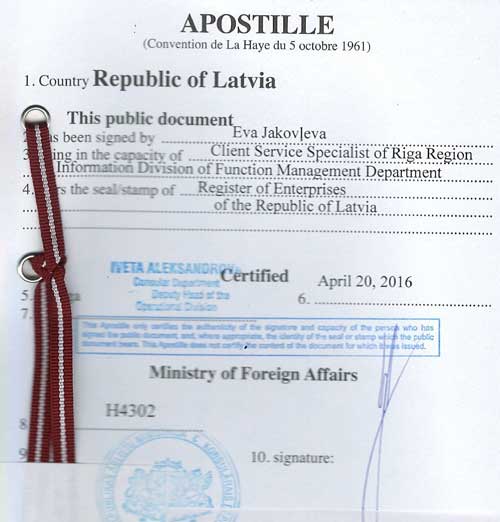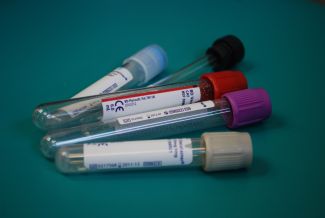
Schmidt & Schmidt covers the full spectrum of legalization services for documents issued in Latvia.
Latvia joined the Hague Convention on the Simplified Authentication of Documents on 11 May 1995; the Convention entered into force on 30 January 1996.
The apostille, or the “Hague apostille” is a certificate that authenticates the origin of a public document (e.g., a birth, marriage or death certificate, a judgment, an extract of a register or a notarial attestation). It confirms the authenticity of the signature and the authority of an official who signed the public document.
Documents issued in Latvia are certified with an apostille in accordance with the Hague Convention of 1961 are recognized in all Member States of the Hague Convention and do not require any other form of certification, such as consular legalization, which considerably reduces the costs and time required for the certification of documents. So far, more than 120 states have joined the Convention.
The apostille is not sufficient for use in the states that are not party to the Hague Convention. In this case, consular legalization applies to a public document.
Designated Competent Apostille Authorities in Latvia
In Latvia, the Ministry of Foreign Affairs holds the responsibility of being the designated Competent Authority for the issuance of apostilles. This involves authenticating documents and ensuring their validity for international use.
When it comes to the pricing for document certification, for a standard document certification within a reasonable timeframe of 2 working days, the cost is 15.00 EUR. However, if a more urgent requirement arises, where certification is needed within just 2 hours, the fee is 30.00 EUR.
The Ministry's role as the Competent Authority ensures that documents receive the necessary verification, allowing them to be recognized and accepted internationally, whether it's for personal, academic, or professional purposes.
The apostille in Latvia is a square stamp in Latvian with the obligatory heading "Apostille" and a reference to the 1961 Hague Convention in French (Convention de La Haye du 5 octobre 1961). The apostille certificate’s sides will be at least 9 centimeters long.
Types of documents

| Can be apostillized | Cannot be apostillized |
|---|---|
|
|
Specific aspects and document requirements for the apostille in Latvia
The apostille process can vary depending on the sender and recipient country, but typically to obtain an apostille for a document in Latvia, you must go through the following procedure. You will need to visit a notarial office along with the original document that requires legalization. It's important to bring along your passport or ID card as well. During this visit, the notary will verify the authenticity of the document and initiate the apostille procedure.
Typically, obtaining an apostille in Latvia takes approximately one business day. However, the processing time may vary depending on certain factors. For instance, if the sample of the official's signature and stamp who issued the document is already registered in the database of sample signatures, the process can be expedited.
In the Republic of Latvia, the apostille process is conducted exclusively in electronic form. Once the apostille is prepared by the notary, you can access both the apostille and the legalized document's text online. This can be done by visiting the official website where you can either input the apostille number or upload the file associated with the document.
In addition to preparing the apostille, the notary also undertakes the responsibility of collecting and remitting the required fees for the certification of your document. The total fee for this service is EUR 25.34, which includes the state fee as well as the applicable value-added tax (VAT).
Effective from April 1, 2019, public documents originating from Ukraine, the Republic of Uzbekistan, Russian Federation, Republic of Belarus, Republic of Moldova, and Kyrgyz Republic must undergo legalization or obtain Apostille certification through a competent foreign authority.
The apostille is issued in a uniform format. In Latvia, it has the form of a printed sticker with a handwritten signature of an official, an official seal, and a hologram.
In cases where apostilles are not recognized, holders of foreign documents will need to legalize them instead. However, If the country of destination of the document recognizes and issues apostilles, then legalization is unnecessary.
Legalization of Latvian educational documents for use abroad
In order for educational documents issued in Latvia, such as school reports, university degree certificates, transcripts of records, enrollment certificates, and other certificates from schools or universities, to be valid and recognized abroad, they must undergo a process of certification through legalization or apostille.
Some of the requirements for the documents may be:
- The document should bear the signature of an official, accompanied by the official's surname, position, and a visible stamp or seal. Clear visibility of the signature and stamp/seal is crucial.
- For multi-page documents, all pages should be bound together, signed, stamped or sealed.
- Excerpts, transcripts, or copies of original documents must adhere to regulatory enactments and may not require additional notarial certification if already certified by the issuing authority.
- Translations of original documents should be certified as per the regulatory procedure, bound with the original document, and confirmed by the signature and stamp or seal of an official.
The apostille or legalization certificate should be affixed directly onto the document. If space is lacking, an additional sheet of paper may be used, attached to the document, and certified by the individual legalizing the document. This sheet should bear the legalization or Apostille registration number for reference.
If an issued education document is laminated, then before legalization applicant has to require a copy of the document which then will be legalized, because for the Embassy of Latvia, it's technically impossible to put a stamp and signature on the laminated document.
Please note that the above process and requirements can be subject to change based on prevailing regulations and policies.
Recognition of the authenticity of public documents within the EU
Latvia has established legal assistance treaties with Estonia, Lithuania, Poland, Ukraine, and Russia, according to which certain documents are exempt from apostille certification:
- Documents originating from countries that adhere to the Convention Abolishing the Legalization of Documents in the Member States of the European Communities. This includes countries like France, Belgium, Denmark, Ireland, Italy, and Estonia. Public documents exchanged between Latvia and these countries are exempt from apostille certification.
- Documents from European Union Member States, European Economic Area States, the United Kingdom (excluding its overseas territories), or the Swiss Confederation are accepted in Latvia without legalization procedures, as per the Document Legalisation Law. This applies to public documents, and there's no need for additional authentications like legalization or Apostille.
Regulation on public documents (EU) 2016/1191 of 6 July 2016
Furthermore, Regulation (EU) 2016/1191 of 6 July 2016 on public documents simplifies the circulation of certain public documents that must be presented in an EU Member State and have been issued in another EU Member State, thus exempting public documents from the confirmation of authenticity with the Apostille with the aim of reducing administrative burden and costs for citizens.
Consular legalization of Latvian documents for use abroad
Consular legalization is the process of authenticating or certifying a legal document so a foreign country's legal system will recognize it as with full legal effect that is carried out by the diplomatic or consular mission of the country in which the document is to be used.
Consular legalization is more complex, time-consuming and costly than the simpler apostille procedure. Whereas apostille is usually issued within one step, consular legalization requires several pre-certifications before a public document can be certified at the embassy or consulate of the destination country.
It is a common requirement that the document has to be translated into the official language of the destination country before submission to the embassy. It is up to the diplomatic mission to decide about the authentication procedure.
The main differences between an apostille and consular legalization of documents
The common feature between apostille and consular legalization is that they authenticate an official document for presentation to institutions in another country. However, they have many differences.
| Apostille | Consular legalization | |
|---|---|---|
| Legal effect | Can be used in all countries that are party to the Hague Convention on the Simplified Legalization of Documents. | Use between States one or both of which is not a member of the Hague Convention, or where one of the contracting States has protested the accession of the other. |
| Difficulty | Moderate. To obtain an apostille, contact the competent apostille authority of the state of origin of the document. | High. For consular legalization, various inland authorities and a diplomatic mission of the state of destination must be involved. |
| Pre-certification | Usually not required. | Is obligatory. |
| Attestation at the state of destination embassy in the state of origin of the document | No need to contact the Consulate of the country of destination. | Is the final step of legalization. |
Apostille and consular legalization in all cities of Latvia
Schmidt & Schmidt provides apostille and consular legalization services for public documents originating from all regions across Latvia. We handle the entire process, from document review to obtaining the necessary certifications, ensuring that your documents are valid and recognized internationally. With our reliable services, you can confidently use your Latvian public documents abroad.
Procurement of documents from Latvia
If the important documents are lost or damaged, or current copies of the documents are needed, the re-issue of the documents is required. It is not unusual for people outside Latvia to encounter difficulties with obtaining new documents when abroad. Our consultants will help you procure new documents from Latvia remotely, and we can arrange for your documents to be sent by courier anywhere in the world.
Certified translation of documents from Latvia
Copies and transcripts of civil status documents can be translated into any language by a sworn translator in Latvia or the translation can be done in the country of destination. We offer certified translations of civil status documents with further certification. The cost of the work is calculated according to the volume of the document in question.
Does the translation have to be apostillized?
Any foreign document issued in one country and used in another country must be legalized for use abroad. Therefore, the authenticity of a certified translation from Latvia needs to be certified by an apostille. Consequently, many authorities may not accept certified translations from Latvia if the translation has not been properly authenticated in Latvia for use abroad. To avoid this confusion, translations should better be made in the state of the destination of the document.

























































